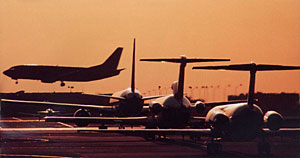 Uxbridge, Canada - On the far side of the world, after an eternity in transit, a few thoughts on an alternative view of globalisation-not that of the hungry capital markets or multinationals, nor the rainbow coalition of Maoists, nihilists and protest partygoers whose social life revolves around disrupting international summit meetings. There's more to this business than you might think from watching television news. Surprise, surprise.
Uxbridge, Canada - On the far side of the world, after an eternity in transit, a few thoughts on an alternative view of globalisation-not that of the hungry capital markets or multinationals, nor the rainbow coalition of Maoists, nihilists and protest partygoers whose social life revolves around disrupting international summit meetings. There's more to this business than you might think from watching television news. Surprise, surprise. 
Take air travel. It used to be the preserve of the global elite, clich?d jetsetters, global business types, stars of stage and screen, in short, the rich and the infamous. For the past two decades in the west, that's not been the case. Now it isn't true anywhere else either. The flight from Kathmandu to Delhi was packed with Indian tourists, but perhaps not the sort that the Nepal Tourism Board had in mind. These were India's equivalent of backpackers-cheapskates, in short. Few of them had been on a plane before they came to Nepal. No one had a passport; they barged into immigration lines but had to retreat from the officer's steely glare when it was discovered that they hadn't filled out their embarkation cards. Few spoke English, that token of a bourgeois education in India. But they had money to spend on a holiday in Nepal, thank goodness. On other more expensive flights to London and North America, other people who couldn't have afforded this a generation ago sat clutching handbags and ordering free drinks. Compared with the vast sea of deprived folk around the world, this expansion at the edge of the lower middle may not seem like much, but mark my words, this group will continue to grow, travel and influence events beyond the mofussil. No bad thing, I say.
On the undeniably positive side of the globalisation debate, the World Cup has united most of us in joy and delight. Never mind the whinges of those whose teams departed early. That's football, folks, whether it's a missed hand ball (sorry England, USA, etc) or a star striker not up to scratch, as the grindingly ordinary British commentator said during the Brazil Germany match, "All that matters is who puts more balls past the goalkeeper.' And the best team did that in the end, putting more balls past the best, most entertaining keeper ever to guard a World Cup goal-Brazil beat Oliver Kahn in one of the greatest finals in a generation. It's impossible not to love Brazil, nor to avoid the easy metaphor that the Brazilian melange-races, ethnic groups immigrant and aboriginal cultures-is globalisation in miniature, great at football, bad at economics, but something to admire and emulate wherever there are political forces that urge spurious notions of purity, exclusivity and racism. For a few moments on Sunday, 30 June, we were all Brazilians.
Alas, there's also a growing global distrust of the globe's only superpower, as each week brings more dire examples of American imperial overreach and arrogance. It's sad to make such an observation in a month that saw the United States celebrate their first Independence Day since last September's terrorist outrage. The newspapers of Europe, Britain and Canada are awash with stories and analysis that express unease and outright disdain for the behaviour of the George W Bush administration. The blatant partisanship in the Middle East, the horrible bombing of a wedding party in Afghanistan, the outrageous holding-to-hostage of global institutions like the United Nations for narrowly defined national interests, corporate malfeasance on a grand scale.... the list can be endless. The best thing one can say is that this administration is an aberration, that the Clinton years show better what America wants from the world, peace in Bosnia, Northern Ireland, freedom spread through expansion of economic opportunity, not coercion. But the creeping feeling that more and more of us are paying a price for the frighteningly parochial politics of America is hard to avoid.
So yes, it's a small world and it's getting smaller. But I can do without the 30-hour voyages, endless queues at security, bad food and jet lag that underline globalisation every time I travel.



